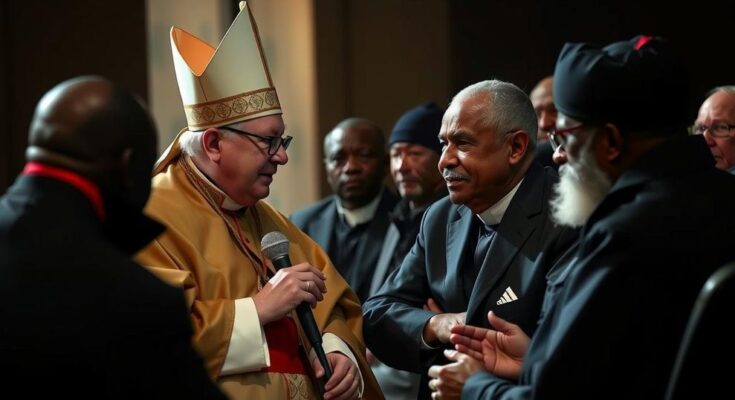Cardinal Stephen Ameyu Mulla of the Archdiocese of Juba articulated the belief that a pragmatic approach to synodality is crucial for achieving peace in South Sudan. He emphasized the need for collective dialogue to address socio-political challenges, underscoring the importance of leaders who prioritize service over power. Despite the growth of the Church, South Sudan faces ongoing instability partly due to unresolved agreements and conflict in neighboring Sudan.
At a Vatican press conference on October 18, Cardinal Stephen Ameyu Mulla of the Archdiocese of Juba emphasized the importance of synodality in achieving peace in South Sudan amidst ongoing conflicts. Cardinal Mulla stated, “The synod journey helps us the Church to resolve many problems together,” highlighting that the practice of praying and reflecting together could create significant change, not only within the Church but also in the wider society of South Sudan, which has faced numerous challenges since its independence in 2011. Acknowledging the detrimental impact of history and conflict between South Sudan and its northern neighbor Sudan, the cardinal recognized the role of the bishops’ conference in overcoming socio-political struggles through dialogue. He remarked, “We have tried our best to continue to help the poor people of South Sudan and Sudan.” The cardinal recalled a Vatican-brokered peace deal between South Sudan’s political leaders back in 2018, which has, unfortunately, not been implemented, leading to ongoing instability. He expressed his determination, stating, “We continue to insist as bishops that this revitalized peace agreement should be implemented by the letter.” Cardinal Mulla underlined the necessity of dialogue not just among the bishops but also among the South Sudanese populace to confront the nation’s pressing social and political issues. Despite experiencing growth within the Church, he lamented, “South Sudan is regressing from a social and political aspect.” Commenting on the ongoing crisis in Sudan, which has displaced many individuals, including church leaders, the cardinal shed light on the humanitarian crisis and the destruction caused by war. He drew attention to the urgent need for effective leadership committed to service rather than power. He noted, “We’re suffering [because of] people who want power but not service.” Cardinal Mulla concluded that synodality represents a path forward—an approach that fosters engagement and cooperation, thus enabling both the church and the government to effectively address the human problems afflicting their nations.
The commentary by Cardinal Stephen Ameyu Mulla of South Sudan comes against a backdrop of significant turmoil and conflict in both South Sudan and its northern neighbor, Sudan. South Sudan gained independence from Sudan in 2011 after decades of conflict but soon plunged into its own civil war in 2013. Efforts to broker peace continued, culminating in a fragile peace agreement in 2020. Nevertheless, inter-ethnic violence, political instability, and the effects of the ongoing civil war in Sudan continue to have adverse consequences. The context for the cardinal’s remarks is thus framed by a history of conflict, a desire for peace, and the urgent challenges faced by both nations in their political and social spheres. The cardinal indicates that synodality—a process of collective dialogue and discernment within the Church—might be pivotal in addressing these complexities.
In summary, Cardinal Stephen Ameyu Mulla asserts that synodality presents a viable avenue for fostering peace and dialogue amid the tumultuous socio-political landscape of South Sudan. His insights reflect the critical need for united efforts in resolving issues stemming from both historical conflicts and current instability, emphasizing that leadership should focus on service to the people. The cardinal’s remarks not only highlight the ongoing struggles of South Sudanese and Sudanese communities but also convey hope that dialogue, collaborative practices, and peaceful negotiations can pave the way for a better future.
Original Source: www.pillarcatholic.com




